new posts in all blogs
Viewing: Blog Posts Tagged with: YA Romance, Most Recent at Top [Help]
Results 1 - 25 of 54
How to use this Page
You are viewing the most recent posts tagged with the words: YA Romance in the JacketFlap blog reader. What is a tag? Think of a tag as a keyword or category label. Tags can both help you find posts on JacketFlap.com as well as provide an easy way for you to "remember" and classify posts for later recall. Try adding a tag yourself by clicking "Add a tag" below a post's header. Scroll down through the list of Recent Posts in the left column and click on a post title that sounds interesting. You can view all posts from a specific blog by clicking the Blog name in the right column, or you can click a 'More Posts from this Blog' link in any individual post.
An area I’ve a personal interest in, as an ex-English teacher, is the HSC English Extension 2 module, which requires advanced students to submit a writing portfolio. I’ve never taught the “new” HSC, introduced in 1999, but it’s always interested me in its approach to comparative study of texts and the rather belated introduction of this creative writing option.
(South Australia, for example, has had a writing portfolio as part of its senior English curriculum for a long time, and back in the early 80s, when I was a senior high school student in the ACT, I was able to choose an English class looking at the form of the short story that also required us to submit a creative writing portfolio. I’ve a great admiration for the schooling system in the ACT, which, like several other states, does not have a final external examination like the NSW HSC. It makes me wonder what might battles may be fought (and lost?) if a national curriculum, which will almost certainly involve a version of the HSC, is enforced. But I digress…)
I always enjoyed teaching creative writing when I was in the classroom (even though at the time I didn’t have particular skills or experience in the area), but I was also aware that many of my colleagues did not feel particularly confident in this area. I don’t know that this has changed all that much—English teachers are very well-trained in teaching formal essay writing and in guiding their students’ responses to literature, but creative writing is a whole other thing. I don’t recall it being much a part of my teacher-training, and let’s face it—responding to students’ creative/imaginative work is much, much harder than assessing an essay.
Add to the mix the commonly-held opinion (or so my anecdotal experience of chatting to teachers would suggest) that students often tend to lose a bit of the creative spark when they get to high school. I think that’s partly a product of adolescent self-consciousness as well as the very content-heavy secondary curriculum. (Also the content of the NSW K-6 English syllabus, which some time ago shifted its emphasis from authentic literature and creative writing to [artificial] non-fiction “text types”.)
I have no doubt that children and teenagers continue to scribble (or these days, type and upload to blogs and MySpace etc) poetry and prose in the privacy of their bedrooms, as they have ever done, but as formal education has become increasingly about academic and vocational outcomes, it’s been harder and harder for teachers and students to carve out a creative niche in the English classroom.
I feel a bit of a fraud writing this—it’s so long since I’ve been a full-time classroom teacher—so I have felt the need to test my own thoughts on the subject against the real experience of current practitioners. Which brings me to the relevance of this rather long-winded and overly-opinionated post to the real purpose of this blog: the documentation of the western Sydney young people’s literature project (which I am coming to think of, in a much needed shorthand, as the westword project!).
From 2009, the HSC English Prescriptions List will change. Some new books have been added—I’m told this is about 15% of the reading list—and texts that have been on the HSC list for many years have been moved to a different focus of study. Last week, I attended a workshop offered by the English unit of the curriculum support directorate of DET, which looked at the new prescriptions list and offered resources and support to develop new units of work. I really enjoyed the workshop—it was good to familiarise myself with the HSC English curriculum, but it was also a great opportunity to talk to teachers from western Sydney about how the westword project might develop programs to best support them in their teaching.
All of the teachers I spoke to confirmed that support for the teaching of creative writing would be very welcome. Even standard students have to write a creative piece in their HSC—it’s worth 15% of their final mark, they can’t study for it, and it seems teachers don’t feel they can give it adequate time in the classroom. And there’s the afore-mentioned Extenstion 2, which it seems not all schools can even timetable on a regular basis.
(Compare this to the time allocated to major works in visual arts and design, drama and music. We wouldn’t think of letting HSC students complete these more or less under their own steam. I can’t help but wonder if this comes back to a widely-held assumption that you can’t teach people to write creative pieces—that you’ve either got the talent or you don’t. But as Libby Gleeson pointed out when she was interviewed by Andrew Daddo on 702 ABC Sydney a couple of weeks ago, we teach people how to paint, sing, play a musical, play a sport—why not writing?)
And it’s not just the HSC. We obviously need to lay the groundwork for skills in creative writing in the junior school.
Let me circle back again to another meeting I had recently, with Susanne Gannon from the University of Western Sydney. Susanne teaches Secondary English Method students—those folk who are going to be English teachers, many of them in western Sydney schools. She has a special interest in teaching her students to become good teachers of writing, and her resource booklet for the course is full of fabulous examples of literature across genres. Susanne agreed with my own concerns about teachers’ confidence in teaching creative writing, and we are looking to work together to develop research and practical programs to address this. (Susanne also has some great ideas about nurturing western Sydney writers as an adjunct to her work in pre-service teacher education, but it’s a bit premature to say more about that as yet.)
So, it’s clear that a priority for the westword project will be supporting young writers by supporting their teachers. There are many ways we can approach this, but I do hope that in the long run, we can produce a module/program that we can deliver in such a way (no doubt involving the creative use of technology) to help teachers (ultimately across the state?) to be better teachers of creative writing. And yes, I’ll be looking to involve professional writers in the project.
I’d really like people’s thoughts on this. Please note that I’m aware that there are many teachers out there who are confident and successful teachers of creative writing, but there are many more that, it seems, would really appreciate more resources and direction in this area. So, any comments and ideas will be gratefully received—consultation must be at the core of everything the westword project undertakes.
This has been a long post—thanks for staying with me. But wait—there’s more! (I’ll be brief.)
On a slightly different tack, many of the HSC English modules require students to select their own text to supplement the prescriptions list for the various modules. I gather that finding appropriate texts outside of the texts commonly studied in schools can be a challenge for the students, their teachers and the librarians that students go to to find a book about X, Y or Z.
I don’t want to reinvent the wheel—I know that HSC English resource lists are being developed by various groups and organisations. What I am wondering is if people think it would be useful if I were to apply my knowledge/extensive reading of contemporary YA fiction to develop reading lists of suitable supplementary texts for various modules, especially the new common area of study, “Belonging”, which seems to lend itself so well to the theme of so many YA novels. (And would such a resource list would be of particular help to Standard students?)
Thanks again, and please leave comments and suggestions.








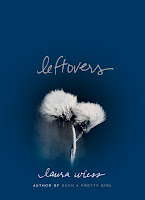

Wiess, Laura. 2008. Leftovers.
Prepare to be wowed. Here is how it begins, "Well." It goes on, "This is harder than I thought it would be. I wish we could have come over and hung out with you before all this, even once, for like a picnic or something. We would have really liked that. I'm not saying it to make you feel bad, I swear. I'm just saying. You have a nice yard. It looks lived-in. This is a good patio, too. I like how the bricks are so worn down, like they've been here a really long time. I know. I have to start, I do, but..."
It's not your typical start. And Blair and Ardith--our two narrators--are definitely not your typical heroines either. Leftovers is the story of broken people living broken lives. I said broken not broke. (Though there are definite socioeconomic differences in our two heroines.) If you loved Wiess' first novel, Such A Pretty Girl, chances are you'll love Leftovers too. (If you haven't read Such A Pretty Girl, you should definitely consider it. I'm not saying everyone will love it. Some don't do brutal honesty and harsh realities well. But if you love brilliant but gritty writing, you'll love Wiess. What do I mean by gritty? She's not afraid to go there. To go to the ugly side of reality. To show readers what it's like on the other side. The dark side of life where happily ever after endings are a joke.)
Leftovers is a tale of friendship and family. Of boundaries and rules. Almost all being broken examples of the above. The friendship is real. Two girls in desperate need of one another. Two girls who can only trust the other. This is a very compelling, very authentic story. It's not "pretty" but it's good.
By the time you hit fifteen, there are certain survival lessons you'd better have learned.
Like that breasts are power. Sad to say, but it all comes down to a matter of supply and demand. Girls have them, guys want them. Even a skank is a hot commodity if she can offer up anything more than a couple of mosquito bites. Not saying she should offer them up, just saying she should recognize her advantage and not put out every time some guy manages to string together a couple of compliments.
Too bad that's all it takes sometimes.
Being user-friendly doesn't mean you're going to be loved. Getting attention is not the same thing. Sometimes it's the exact opposite.
And while we're talking about being used and abused, you should know that there are some things you tell and some things you handle by yourself, the best you can. You can't always rat and still hope to be saved when somebody does you wrong. The backlash will dog you till you die.
Or till you wish you were dead.
See, guys freak out. They hit critical mass and blast nuclear, white-hot anger out over the world like walking flamethrowers.
But girls freak in. They absorb pain and bitterness and keep right on sponging it up until they drown.
Maybe that's why nobody's real worried about girls going off and wreaking havoc. It's not that the seething hatred and need for revenge isn't there, hell no. It's just that instead of erupting and annihilating our tormentors, we destroy ourselves instead.
Usually. (2-3)
232 pages
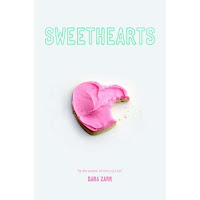
Zarr, Sarah. 2008. Sweethearts.

A dripping faucet.
Crumbs and a pink stain on the counter.
Half of a skin-black banana that smells as old as it looks.
If I look at these things and at nothing else, concentrated on them and stay still, and don't make any noise, this will be over soon and I can go home without Cameron's dad ever knowing I'm here.
In that image-packed opening to the prologue, we meet Jennifer Harris, a fifth grader, who followed her best friend, Cameron, home from school on her birthday. He told her he had a special gift just for her. What she didn't know--couldn't know--was that Cameron's father was an abusive man. A rageful man.
Some memories are slippery. There are things I want to remember about Cameron Quick that I can't entirely, like the pajamas he wore when he used to sleep over, and his favorite cereal, or how it felt to hold his hand as we walked home from school in third grade. I want to remember exactly how we became friends in the first place, a definite starting line that I can visit again and again. He's a story I want to know from page one.
Isn't that a great opening? That's the first paragraph of chapter one. Jenna is now in high school. (I want to say 17, but it could be 16 or 18.) She's Jennifer no longer. Jennifer was lonely, miserable, teased, picked on, a cry baby who wore her heart on her sleeve. Jennifer was an outcast. A loser. Jenna, well, Jenna is transformed. She's beautiful. She's popular. She's scared and sensitive on the inside (at times) but doesn't show it. Jenna Vaughn. J.V. Cool kid at last.
Sweethearts is the story of what happens to Jenna's life when Cameron Quick comes back from the dead. Okay, this isn't supernatural. Her mother let her believe a lie "for her own good" of course. Cameron Quick moved away quickly, suddenly, without a word, without a trace. The facts? His mother had finally worked up the courage to leave her husband. Cutting all ties to the past. Trying to start over--out of sight--somewhere new, somewhere they couldn't be found.
Can Jenna reconcile her past with her present? Does her heart still have room for her former best friend?
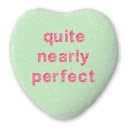 Sweethearts is a wonderful novel. I loved it. I really and truly loved it. The writing, the style, the characters, everything about this novel was so good, so right, as close to perfect as a writer can hope to achieve. Sara Zarr's powerful imagery is just fabulous in my opinion.
Sweethearts is a wonderful novel. I loved it. I really and truly loved it. The writing, the style, the characters, everything about this novel was so good, so right, as close to perfect as a writer can hope to achieve. Sara Zarr's powerful imagery is just fabulous in my opinion.
There are moments I missed being Jennifer the way you can miss versions of yourself when you get a totally new haircut, or a favorite pair of jeans finally wears out. Even though it was sad that I'd spent so much time home alone eating and reading, the truth was that those were some of my favorite memories. Getting lost in a book with something sweet or salty or hopefully both, like stacks of crackers with butter and jelly, seemed, in some ways, the closest I'd gotten to complete and total happiness. (66)
*Note I read an ARC of this.

By:
Becky Laney,
on 1/10/2008
Blog:
Becky's Book Reviews
(
Login to Add to MyJacketFlap)
JacketFlap tags:
TBR Reading Challenge,
YA Fantasy,
YA Romance,
Young Adult Challenge,
Speculative Fiction Challenge,
Winter Reading Challenge,
A ~ Z Reading Challenge,
2007,
series challenge,
Chunkster Challenge,
Add a tag
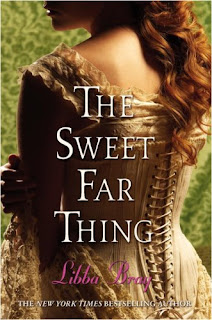
Bray, Libba. 2007. The Sweet Far Thing.
The Sweet Far Thing concludes the trilogy following Gemma Doyle and her quests in and out of the realms. (The first being A Great and Terrible Beauty which I read at least six months or so before I started blogging so there's no record of what I thought. And the second being Rebel Angels which I reviewed last winter/spring.) The book is heavy both in content and weight. 819 pages. Most of them of seventeen-year-old Gemma confused about who she is and what she wants. At the end of Rebel Angels, Gemma bound the magic of the realms to herself. She had promised several different peoples or tribes that she would later share the magic and make peace throughout the realms; she would issue in a new era of peace and unity. The close of Rebel Angels also saw the death of Circe. (or did it???)
The Sweet Far Thing picks up three months later. It is spring. Felicity and Gemma are getting ready to make their debut in society. And Ann, poor Ann, is still going to be a governess. She's still being treated horribly by the other girls at Spence Academy. Mrs. Nightwing is planning a big masked ball in honor of the graduating class--the class of which Gemma and Felicity and Ann are a part. The other buzz around campus is the ongoing work to complete the East Wing. Mrs. Nightwing is determined that the East Wing which was originally destroyed by fire twenty-five years before, needs to be rebuilt in order for Spence to regain its honor and prestige. But there are many people who fear what will happen when the East Wing is rebuilt. They're afraid of what might become unsealed and unburied. The Gypsies. Mother Elena especially is full of warnings. Most of which go unheeded. But such is the way with those that prophesy foreshadowing.
Getting back to Gemma. Gemma was having an identity crisis of sorts in Rebel Angels. She feared that no one really loved her for her. That her father and grandmother and brother all have their own "idea" of who she is. An idea that is far from reality. And she's worried that her friends just love her, just include her because of her magic, because of her power. She was tempted for a while by a boy, Simon, but then felt he didn't love her for her, know her for her either.
This quote is from Rebel Angels:
To Felicity and Ann, I’m a means into the realms.
To Grandmama, I am something to be molded into shape.
To Tom, I am a sister to be endured.
To Father, I am a good girl, always one step away from disappointing him.
To Simon, I’m a mystery.
To Kartik, I am a task he must master.
My refelection stares back at me, waiting for an introduction. Hello, girl in the mirror. You are Gemma Doyle. And I’ve no idea who you really are. (396-397)
Back to Sweet Far Thing. So Gemma is still learning who she is, what she wants, what she needs, and even learning what she fears most. When the book opens, the reader learns that Gemma has not been able to regain access to the realms. She can no longer conjure up the white door. She has seemingly lost her power. Also of note, the dreams and visions have stopped for the most part. But with 819 pages, the reader knows this powerlessness won't last long. Gemma will find a way; she always finds a way to get what she wants or what she thinks she wants.
There is mystery, confusion, epic battles between good and evil, trickery, betrayal, secrets, lies, love and lost love, fear and hope. There is family drama and school drama. And drama between friends as boundaries are pushed or nudged and little lies are told. Fans of the series will no doubt be anxious to read this saga through to its bittersweet conclusion. (I read it in two days.) But I'm unable to predict how they'll feel about the ending. I know my response. (Though I won't go there here in this post.) But how will fans react?

Hale, Stephanie. 2007. Revenge of the Homecoming Queen.
Aspen Brooks is beautiful. She's beautiful and she knows it. Not that she's deep in her heart of hearts a total snob. Not completely. Oh, on the surface, Aspen may be your typical beautiful, shallow girl who dreams of nothing but winning the tiara. But deep down there has to be something more, right?
This is such a movie moment. This is the part where the fabulous herone's dream finally comes true. I, of course, am the fabulous heroine. My dream of becoming homecoming queen is just moments away. I can almost feel the weight of the tiara on my head. Eww . . . I hope it doesn't mess up my hair because I'm having a stellar hair day. (1)
Homecoming week. The time has come. Will Aspen's dreams become reality? Yes and no. Is the title of homecoming queen hers? No. Sadly, she's just a princess on the court. But that could be the best thing that ever happened to our heroine. Rand Bachrach has just been named King. Rand? Really? A person she doesn't deem popular enough to even speak with in passing let alone be friends with? Something strange is going on here. Something or someone is out to ruin her perfect life.
A strange life-altering week is on the way for our heroine and her friends and family. A week full of ups and downs and hidden moments. The time has come for the ultimate test--Is Aspen Brooks a snob? A shallow, mindless snob? Or is there something deeper, something greater, something more deep within and waiting for the perfect moment to show itself...
Fun, lighthearted, enjoyable. The only thing that irks me about this book is that it shows our heroine drinking a hot drink--cocoa or chocolate or something similar--through a straw. Realistic? No. Here's why. It's impossible to drink a hot drink through a straw without burning your tongue. Not just a tip of the tongue that you can get away with ignoring. But the whole darn thing. You won't be able to properly taste food for a week. So I'm totally not buying her excuse that she doesn't want to dribble chocolate on her clothes so the straw is the only way to drink hot chocolate. Not hot chocolate bought at a restaurant or coffee shop. It would be too hot. Way too hot. Maybe at home where you can heat it and know that it is just lukewarm and not hot hot. But still. She calls this the best hot chocolate of her life. There's no way it could have come through a straw and been appreciated. If she had sipped the chocolate through a straw she'd be saying something alright--but it wouldn't be kind words or happy thoughts about how good it was. I just don't buy that anyone would volunteer for this experience more than once. But other than that the book is fine.
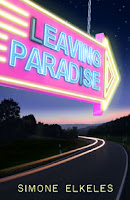
Elkeles, Simone. 2007. Leaving Paradise.
Leaving Paradise is narrated by two teens--Caleb, a teen just released from juvenile detention for running over someone while he was drunk, and Maggie, the teen, the victim, who is still recovering from her injuries and learning how to walk, how to function. Caleb may seem at first glance like an unlikely hero for a book. After all, if he really was drunk, really did run someone over, really did leave the scene of the accident, then why is he such a good guy? Why is he so likable? Maggie used to have a huge crush on Caleb. He was the twin brother, of one of her former friends, Leah. The accident ended their friendship and dashed Maggie's dreams of happily ever after with that guy. After all, how could she ever love the guy who hit her? But a romance is straight where this book is heading--at least at first glance. Maggie and Caleb. They're forbidden to see one another, forbidden to have contact. Yet fate has a different plan, a different reason for always making sure these two are thrown together. Is such forgiveness, such love, such grace possible? The back cover reads What happens when the person who damaged you for life . . . becomes the person you trust most?
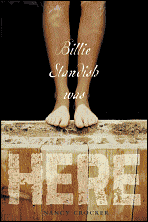
Crocker, Nancy. 2007. Billie Standish Was Here.
My name is Billie Standish. William Marie Standish. It's pretty clear what my parents' expectations were. The "Marie" was a nod to Daddy's mother because she died two months before I was born. Otherwise who knows? I might have been William Edward.
My parents were told at my birth that there would be no more babies. So you might say my name was down payment for using their one chance to have a son.
For a long time I was mostly invisible. That was okay, though. Once you've figured out you can't do anything right it's just good sense not to call undue notice your way. Why step out of the shadows and get yelled at for blocking somebody's light?
Besides, my mama's always had the kind of temper that gets the nearest dog kicked once in a while just for being there. Being invisible had its benefits. (1)
Billie's story begins in 1968. The summer of 1968. Set in Cumberland, a community Billie sums up in this way, "Nothing much bigger than a silent fart can get past the neighbors in a town this size." (3) It's been raining, and raining, and raining, and raining for weeks on end when our narrative opens. In fact, practically the whole town has deserted fearing the levee will break and the whole place be flooded, washed away. Everyone is gone, in fact, except for Billie's family and Miss Lydia Jenkins and her grown-up son, Curtis. That summer will be the best and worst in young Billie's life. Her friendship with Miss Lydia will change her life forever. The difference will be night and day. The joy, the hope, the love, the support, the inspiration. But her one encounter with Curtis will leave her with nightmares and scars that will take years to overcome.
This book has it all. Well-written, unforgettable characters, each one seemingly human and authentic. Charming narrative style. It has its ups and downs as far as drama goes. Showing that life is made of joy and sorrow, hope and despair, love and hate. But it is truly a beautiful, beautiful masterpiece. It just works. It's the kind of book that I finished and immediately wanted to read again. So far I've resisted the temptation. But it is something that I crave, that I want. I want to revisit Billie and Miss Lydia and Harlan. They're real to me. They're my friends. Their story is one that will stay with me.
http://www.nancycrocker.com/
I'm A Reading Fool's Booktalk of Billie Standish Was Here.
Seven Impossible Things Before Breakfast's Interview with Nancy Crocker
Big A, Little A's review of Billie Standish Was Here
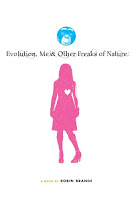
Brande, Robin. 2007. Evolution, Me & Other Freaks of Nature.
This one will be short. I hope. I'm not going to comment on the "evolution" bit of this book. Because I don't think that's where I had my problems with it. I think this book was just a little too close, a little too personal for me to comment on. There were parts--not all parts mind you--that I could definitely see myself in the narrator. But because of that, it was a very uncomfortable read. I didn't want to see a reflection of me in junior high and high school. Not a fun journey. For example, her relationship with her parents. This is a strict household. There are many things she's not allowed to do. One of the things she's not allowed to do is watch or read certain movies or books. So our narrator, Mena, has never seen Lord of the Rings. (Growing up, in some ways we were restricted. I didn't see Star Wars until I had graduated from high school. I saw the movies for the first time about six months before they all hit theatres again "remastered.") But there are some big, big, big differences as well. Her family. Her church. Her school. What can I say? Her "church" is not like any of the churches I've ever encountered. I've never heard of a preacher behaving in such a way or preaching such a sermon. That's not to say that the rare exception might not exist. Her youth group. It doesn't really surprise me that her youth group can turn vicious. Pastors, I don't expect that from. Teenage guys and girls, well, it's not such a surprise that teasing, that bullying, that being snobby or snotty, that being cliquish is a part of it. Social hierarchies, making yourself feel better by making other people feel bad...that can happen whether you wear the label Christian or not. I think in part that's why Christians have a bad name in some circles is because of people who really don't get it at all. They should be called anything but Christian. I haven't really read a book--a YA book--where a youth group or a pastor was presented in a good light, an accurate light, a biblical light. There are no "good" literary examples. Her school. High school is tough unless you're part of the privileged few. Mena isn't. Not anymore. Her youth group has snubbed her. Her pastor has kicked her out. Her parents aren't speaking to her. She's got zero friends. Zero support group. So it was hard for me to "like" a lot of the characters. For the most part, I liked Mena, however. I liked her crush, her lab partner, Casey. There were some things I liked about the book, I did. But there were many times I felt uncomfortable, awkward reading it. That's not the author's fault. It's my fault. Reading is subjective. I don't feel that the book is hostile to true Christianity for the most part. (Keeping evolution out of it of course). I think the book addresses the very real issue of hypocrisy. But there were parts I wanted to cringe because of what was going on. As I said, that's all me. I didn't cringe because of the writing, the style, the language. I didn't cringe because of bad cliches and metaphors. I didn't cringe because of bad dialogue. It was just that the subject matter, for me, was one that made me uncomfortable. Just like thinking about my past makes me uncomfortable. I attended a Christian school, a private school. I wouldn't relive those junior high and high school years for any amount of money. The "Christian" part was a complete mockery. Granted, the meanness may have been tame compared to public school, I don't know. But it wasn't pretty at all if you weren't part of the select few. This book wasn't set at a private school. It's a public school. But teens wearing the label "Christian" and acting anything but...a little too close to home for me to read comfortably.
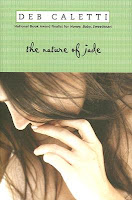
Caletti, Deb. 2007. The Nature of Jade.
When you live one and a half blocks away from a zoo like I do, you can hear the baboons screeching after it gets dark. It can scare the crap out of you when you're not used to it, as I found out one night after we moved in. (5)
Jade, our narrator, is a girl with a fondness--a semi-obsession--with elephants. She loves to visit the zoo, of course, and she also loves to watch the elephants online on the zoo's web cam.
Watching them isn't always thrilling and action packed, but I don't care. See, what I really like is that no matter what high-stress thing is going on in my world as a whole (Christmas, SATs, natural disasters, plane crashes, having to give a speech and being worried to death I might puke), there are the elephants, doing their thing. Just being themselves. Eating, walking around. They aren't having Christmas, or giving a speech, or stressing over horrible things in the news. They're just having another regular elephant day. Not worrying, only being. (7)
One day while watching the elephants on her computer, she sees a boy--a teen boy--with a baby. He's in a red jacket.
You pass a bunch of people in a day--people in their cars, in the grocery store, waiting for their coffee at an espresso stand. You look at apartment buildings and streets, the comings and goings, elevators crawling up and down, and each person has their own story going on right then, with its cast of characters; they've got their own frustrations and their happiness and the things they're looking forward to and dreading. And sometimes you wonder if you've crossed paths with any of them before without knowing it, or will one day cross their path again. But sometimes, too, you have this little feeling of knowing, this fuzzy, gnawing sense that someone will become a major something in your life. You just know that theirs will be a life you will enter and become part of. I feel that sense, that knowing, when I look at this boy and this baby. It is a sense of the significant. (10).
But Jade isn't just a girl who likes animals--likes the zoo. She's a girl with an anxiety disorder.
It wasn't like I panicked every time I was somewhere high up, or in an enclosed space, or during a storm. It could be none of those things, or all of them. I could (can) panic in a car, a new situation, any time a person feels a twinge of nerves. It's a twisted version of Green Eggs and Ham: I could panic in a train! I could panic on a plane! I could panic on the stairs--I could panic anywhere! (17)
It goes on to say:
People who have these panic attacks sometimes have "social anxiety," which means, basically, you don't want to go out in the world. But I think sometimes they've got their cause and effect screwed up. Would you want to get on a bus if you thought your body might do this? Would you want to be in a crowd of people? Sitting in Math? That kind of fear, that kind of physical out-of-control is . . . well, private. Anyway, I am not my illness. "Girl with Anxiety," "Trauma of the Week"--no. I hate stuff like that. Everyone, everyone, has their issue. (17-18)
I like that Jade doesn't let this issue define her. She doesn't let it control her. It's there. It's never completely gone. But she is so much more than just a girl with anxiety.
The book is in some ways your typical teen novel. Girl likes boy. Girl wants boy to notice her. Girl gets excited when he does. Girl has friends to talk and gossip with, etc. But most typical teen novels with high school narrators aren't focused on elephants, zoos, and volunteering. Most love-interests in these kinds of books aren't single fathers or sole caretakers of young children. So it is a YA romance novel. But it's a bit more than just a YA romance novel. And like many YA books it deals with a teen defining and redefining herself. Finding out who she is and what she wants and seeking out, discovering, what it will take to get there.
I loved this novel. I did. I would read certain passages and they would just ring true. The inner-thoughts of a girl with anxiety? So right on. So true. So authentic.
My inside voice too often screams unreliable things at me, misinformation--that I am in danger, that someone I love is in danger, that now is the time to panic, to flee. I am happy, because it is just so good to know that it can give a whispered message, a simple, quiet knowing, and that it can be right. (34)
I just love the style. I think Caletti definitely has a gift with words...
Every big happening has a moment of plunge, that moment of decision, usually instantaneous even if you've been thinking about it forever. That now! Toes at the edge of the pool, looking at the water, one toe in, looking some more, and then, suddenly, you're in, and it's so cold, but nice, too, and you don't even remember where in there you decided to jump. (104-105)
So, I'd definitely recommend this one.
http://www.debcaletti.com/index.php

Zevin, Gabrielle. 2007. Memoirs of A Teenage Amnesiac.
Who are you? Who are you really? Are you the composite of your memories? Do your memories make you you? What would you be--who would you be--without your memories? Memoirs of A Teenage Amnesiac tells the story of Naomi. It's divided into three parts: "I Was," "I am," and "I Will." Here is how it begins:
Above all, mine is a love story.
And like most love stories, this one involves chance, gravity, a dash of head trauma.
It began with coin toss.
The coin came up tails; I was heads.
Had it gone my way, there might not be a story at all. Just a chapter or a sentence in a book whose greater theme had yet to be determined. Maybe this chapter would have had the faintest whisper of love about it, but may not.
Sometimes, a girl needs to lose.
Is that accurate? Is Memoirs of A Teenage Amnesiac 'above all' a love story? Yes and no. It's more and less than a love story. Naomi is a teenage girl. The co-editor of the high school year book. Her co-editor is her best friend, Will. The coin toss. The camera has been left behind. Someone needs to go back inside and get it. Naomi is 'fated' to do it. The trip back to the parking lot with the camera ...well, it ends with her at the bottom of the front steps with a concussion.
As you have guessed by now, she wakes up with amnesia. She's a junior in high school with no memories past the age of twelve. Her 'rescuer' is James Larkin. Her boyfriend is Ace Zuckerman. Her best friend is Will. Her father. These are the people in her life trying to tell her who she is, who she was, what she's like, what she does. But everything feels off for Naomi. Nothing feels right. Everything feels different, feels weird, feels foreign. Her boyfriend? She doesn't know what she ever saw in him. Her best friend? Well, he knows too much, expects too much, hopes too much, needs too much. The only people she feels comfortable with are the ones that didn't know her before her accident.
Can Naomi find out who she is? Who she really is? In the midst of these identity crises, Naomi fluctuates on who she wants to be with, who she likes, who she loves, who she's attracted to. [But it's more than that. Her hobbies, her interests, her likes and dislikes...they've changed.] This isn't the story of one boy and one girl. It's the story of a girl who 'feels' several different personas and find potential love interests with each persona she adopts. Which one is really her? Who does her heart really belong to?
So I'd say this is a story all about identity. All about choices. About being authentic. About being yourself. About not being afraid of changes.
I enjoyed this one. But I didn't love, love, love it. I had a few problems with it. But overall, I'd say it was a good reading experience.
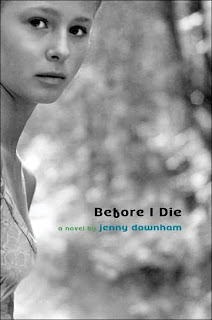
Downham, Jenny. 2007. Before I Die.
There are no surprises in Before I Die. What do I mean? Well, if you're expecting a happy ending with a miracle cure, you'll be disappointed. Our heroine, our narrator, is dying throughout the book, and does in fact die. Some people are drawn to these types of sad, tragic, heart-breaking dramas. Some authors are known for it, specialize in weepy women as their main audience. While Before I Die is sad, it is so much more than just another sad book. Our narrator, Tessa, is sixteen and dying. That is sad in and of itself. But Tessa's problem is that she doesn't want to die before she has a chance to live. If she's going to die, she's going to make the most of every single moment. She doesn't want to waste her time with trivialities. No school for her. No obeying her parents' rules. No obeying anybody's rules. She wants to experience it all--sex, drugs, alcohol, shoplifting, love, happiness. She wants to feel it all, live it all. She wants to pack a whole lifetime of experience into the few months she has left.
This is a drama or melodrama about life, family, friends, and love. Her relationships aren't easy. Dying isn't a piece of cake. It's hard for her to get along with her mother, her father, her brother, her best friend, her boyfriend. Life is full of ups and downs that goes for everyone--Tessa's dramas are magnified even more by the fact that her time is limited. So normal teen angst can be a bit more angsty and intense.
The writing is good. While this book may or may not be your kind of book--it might be an acquired taste to dwell on death and dying and leaving everyone you love behind--I want you to be aware of it at least. To know that there is a book out there that while emotionally manipulative--it has to be--is quite good. There was a time that I could almost weep on command at any sad story, any sad movie, any sad song. And while that still happens sometimes--I won't lie--I like to think that I've matured some. I was doing so well with this one, but even my heart wasn't made of stone at the very end.
S
P
O
I
L
E
R
As a teen, my experiences with death (with losing a loved one) were practically nonexistent. However, as an adult, I've lost a grandmother to congestive heart failure and diabetes, and a grandfather to cancer. (My other grandfather died of cancer a year before I was born.) And I've lost another person whom I was extremely close to to cancer. (Imagine getting the diagnosis the week or so before Thanksgiving, and then dying the first week of December.) The past six or seven years have been rough for me. Cancer is a scary word. A life-changing word. One that strikes fear in me. I've seen it up, close, and personal. It is ugly. It is scarring. It is terrifying. So reading about a girl with cancer, watching her die, even though the circumstances are so far removed from watching a grandparent die...some truths are universal no matter the age. So when it came time for Tessa's death scene, her surrounded by family, it was all too real for me. The sights. The sounds. Everything. Because I have lived the death bed scene--with my grandmother--this one was frighteningly real. I don't know if there are enough words to describe what it is like to watch someone you love die. The pain, the shock, everything. It's just too much too soon. You don't want them to suffer. You know it's coming. But to watch them gasp for breath, to hear the gasps for breath, to hear the gurgling noises, well, this scene got to me. The death bed scene was hard to read because it was so authentic. I don't know if all readers will pick up on just how authentic it is. To sit there and watch someone you love die. To see someone you love unconscious, and not really knowing if they can hear you, if they can feel you loving them, supporting them, letting them go. Of not knowing how to say goodbye but knowing that this is your only chance.
I didn't love every minute of this one. I couldn't. Tessa wasn't always likable. She wasn't always pleasant to be around. Tessa's vision of how to spend her last months and weeks wouldn't mesh with my vision of how I'd spend my last days. Her priorities aren't mine. Her choices, her views are far removed from mine. But Tessa's story is moving just the same.

Jones, Carrie. 2007. Tips on Having A Gay (EX) Boyfriend.
Tips On Having A Gay (Ex) Boyfriend covers one week in the life of high school senior, Belle Philbrick. The book opens on Saturday, the day that her boyfriend tells her a startling truth: I won't ever love another woman because I'm gay. Belle's reaction is one of shock obviously: It isn't every day that my high school boyfriend, Eastbrook High School's Harvest King, for God's sakes, tells me he's gay. It's not every day that the Harvest Queen is dumped in the middle of a road in my mother's silly subdivision with the stars watching the humiliation and the dogs barking because they want to come help tear my heart out and leave it on the cold, gray ground. It isn't every day that my entire world falls apart. Not wanting to become one of those whiny girls that complains all the time about their exes, Belle promises to give herself one week where she's allowed to be miserable, to whine, to complain. One week to get over Dylan, the boy now in love with Bob. (Bob. Dylan. The new couple on campus.) What's worse for Belle than knowing that he's already found someone new? How about hearing that Bob and Dylan were seen making out together in some parking lot? How about having to be near Bob in German class all week? How about catching Bob and Dylan buying condoms at the drug store? Take your pick. Belle's not having an easy time tolerating her ex's new squeeze.
During the course of this week, she relies on her best friend, Emily, and on someone she never expected to confide in, Tom, a boy she's known for ages. A boy that's always teased her. Belle's week has ups and downs. It has its moments of humor, and its moments of heartache. Plenty of confusion to go around. Some anger as well.
Top Ten Reasons Why I Can't Believe I've Been Dumped For Bob
1. He hums during German class.
2. His glasses are thicker than the soles on L.L. Bean hiking boots.
3. He smells funny, like mothballs or something, mixed with metal.
4. He hums Beatles songs in German class.
5. He's in band.
6. He scratches his head too much.
7. He hums Beatles songs in German class OFF-KEY.
8. He wears tighty white underwear that show his butt because his pants are always doing that working man's smile thing on him.
9. He hums Beatles songs in German class OFF-KEY and taps his FEET in time.
10. He's a boy.
Belle's voice is honest and funny. And Tips On Having A Gay (Ex) Boyfriend is an enjoyable read. I can't say too much more without revealing any spoilers...but I really enjoyed this one.
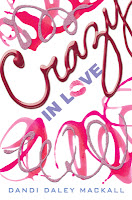
Mackall, Dandi Daley. 2007. Crazy in Love.
"Okay, so I do hear voices in my head, but they're all mine. And before you go dialing Psychiatrists-R-Us, consider the fact that I'm going to need all the help I can get just to have a fingers-crossed, fighting chance of getting through today" (1).
Mary Jane is a girl with problems. Not life-threatening problems, but problems nonetheless. These problems concern her reputation. You see, at a class get-together—a Julius Caesar film-watching get-together—Mary Jane was seen chatting with Jackson House. No big deal, right? Wrong. Jackson House is the boyfriend of one snooty Miss Popularity, Star Simon. When Mary Jane and Jackson leave the party to go pick up a case of diet coke, the rumors start flying. Though they were only gone for four minutes and did in fact return with the aforementioned diet coke, the rumor going round is that Mary Jane knows how to have a good time.
Is Mary Jane smart enough to deal with Star, Jackson, and what's left of her reputation?
Read the rest of my review in The Edge of the Forest. If a new edition has been posted already, check the archives.
http://www.dandibooks.com/
Chappell, Crissa-Jean. 2007. Total Constant Order.
Frances Isabelle Nash (Fin) is a teen under pressure. Within the past year, she's moved from Vermont to Florida, her parents have divorced, and she's feeling overwhelmed with urges to count and draw. These 'strange' compulsions to flick light switches, to draw objects with a certain number of points, or draw things a certain number of times, have been increasing over the past few months. Fin is also finding it more and more difficult to sleep.
Under much duress, Fin starts seeing a therapist who prescribes Paxil. But Fin discovers that prescription medications can sometimes have side effects that just aren't worth it. Around the time that she's trying to come to terms with having obsessive-compulsive disorder (OCD), she meets a boy who changes how she views everything: Thayer.
To read the rest of the review where I discuss how much Thayer impacts her life....visit The Edge of the Forest October/November edition. If you're reading this posting later...after the fact...then look for it in the Edge of the Forest archives.
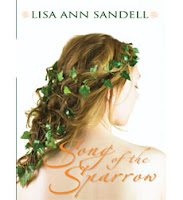
Sandell, Lisa Ann. 2007. Song of the Sparrow.
Song of the Sparrow is a wonderful verse novel that retells the story of Elaine the Lady of Shalott. While the literary tradition has her as beautiful but essentially weak and desperate, Sandell's Elaine is strong, brave, and while she, for a time, is lovesick on Lancelot, she is not too desperate or clingy. (Not, I'll die without his love desperate.) Meet Arthur, Elaine, Gwynivere, Lancelot, Tristan, and Gawain in this new telling of love and war. The poetry is powerful and quite effective in communicating the behind the scenes emotions as well as capturing the senses--especially the sights and sounds of battle camps and war.
Here is a snippet from the tenth chapter:
I wish I could go back to that time,
when my mother would smile
the gentle smile that told me,
all is right and well.
Back to that time when I was
young
and loved
and safe.
When we were all safe.
That things change,
that people change,
and die,
that we grow older,
that life brings the unexpected,
the unwanted,
oh,
some days it feels me with
a measure of lightness, for
I will be a woman soon.
But other days,
the very thought
of growing older,
of not being that small girl
who danced over river rocks,
whose brothers held her hands,
whose mother lived,
the very thought of it
crushes me,
till it is stopped,
by the world
outside
my memories.
Shanahan, Lisa. 2007. The Sweet, terrible, glorious, year I truly completely lost it.
Originally published in Australia, The Sweet, Terrible, Glorious Year I Truly Completely Lost It is a fun YA romance that many girls--from preteen to adult--will enjoy. (Okay, maybe not every adult will enjoy this one, but those young at heart just might!) Meet Gemma Stone. She's feeling a bit out of sorts since her sister announced her engagement. Her sister, Debbie, is marrying a boy she's only been dating for one month. Now, Gemma is being dragged to bridal fairs and made to try on ugly dresses--though I bet no one can guess what she ends up wearing!--and spending lots of time with her sister's future in-laws and her sister's three best friends/bridesmaids. To say she is wishing herself far far away is an understatement. Everything is "Debbie, Debbie, Debbie." And she is expected to drop everything so she can do all these 'favors' and 'errands' and what not for her sister. But in the midst of all the family drama, Gemma is making time for herself. She's got a crush on a guy named Nick. A guy who only acknowledges her existence when it's convenient for him. (Most often when he's trying to get a petition signed). Nick casually mentions to her that she should try out for the school play. The drama department is doing The Tempest by William Shakespeare. She gathers up her courage, and decides to be brave for once in her life and goes after what she wants. What does she want? Nick's attention and approval. What she gets? The attention of the school weirdo, Raven, a 'deliquent' sort who comes from a long line of troubled brothers all named after birds--Crow, Magpie, Raven, Sparrow, etc. But Gemma is about to learn that love is full of surprises and that first impressions can be way off the mark. Raven or Nick? Which one is worthy of her time and devotion?
This book is a super-fun romance novel that I couldn't help loving. From her family dramas to her boy troubles, Gemma is a narrator I enjoyed spending time with.
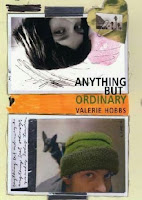
Hobbs, Valerie. 2007. Anything But Ordinary.
When he was fourteen, Bernie Federman fell in love. And he never fell out. Except once, almost. But that was four years and a lifetime later. By that time Winifred (she was calling herself Wini) had become somebody he hardly knew anymore. An ordinary girl. (3)
When he was thirteen, Bernie Federman had no idea who he was. Was he the clone of Magnus Morris, his maternal great-great-grandfather, the famous inventor (a brain) who made and lost a million dollars before the age of twenty-three? His mother said he was. Or was he simply the son of a man who worked in a tire shop from six a.m. until six p.m., and was snoring in his La-Z-Boy halfway through Wheel of Fortune? (4)
So the long and short of it was this:
When Bernie Federman was fourteen, he fell in love.
When he was fifteen, he saw his first naked girl.
When he was sixteen, he began to think that someday he might just write a novel.
When he was seventeen, his mother died. Bernie fell from number two in his graduating class to number forty-three, and by graduation had slipped to the muddy bottom. Winifred, of course, was number one. (18)
With a title like “Anything But Ordinary” you expect something un-ordinary or extraordinary. But that’s not what you get. While there were certain phrases that stuck-out in Anything But Ordinary which made me feel Hobbs was a talented writer, overall, I thought the plot was very typical, very standard, very ordinary, very average. Perhaps I can best illustrate what I’m talking about. Sometimes movie trailers have all the good bits of the movie. You see thirty seconds or a minute of what the movie holds. If the movie doesn’t offer anything more than that--if everything else is just okay--then you feel slightly disappointed. You almost wished that the trailer had been the movie you saw. I can pick probably six or seven quotes that I enjoyed, really enjoyed, from the text. But as far as the rest of the text, the plot, the characters, the pacing....everything was just ordinary. It has all been done before. This is All by Aidan Chambers. Megan McCafferty’s Second Helpings and Charmed Thirds. Anatomy of a Boyfriend by Daria Snadowsky. When you use the formulaic plot of highschool sweethearts who face troubles, temptations, and obstacles with their first year of college--particularly relationship problems because of distance or “changing” personalities, then you need a little something extra to make it worth the reader’s time. What is different about this couple? This narrator? This story? What hasn’t been said and done before? In this case, it was very little. Bernie is the boyfriend. He’s a good guy, essentially, but he’s a little lost at the beginning of the story. Wini or Winifred is the girlfriend. She’s a good girl, essentially, but she’s a little lost at the end of the story. The two had always planned to go to college together, but after the death of his mother, Bernie loses focus in his schoolwork. He becomes depressed and worried about his alcoholic father. He feels that his life really is fated to be one of working in a tire shop or as a mechanic. Something “hands-on” whether than intellectually stimulating. Gone are his dreams of becoming a writer, of changing the world with his words. Winifred cannot, will not except Bernie as he now is. She wants the Bernie-that-used-to-be. She gets accepted into a college in California--as far away from New Jersey as a girl can get. Bernie is upset, crushed, disappointed, frustrated that his girl wants to put that much distance between them. So as the semester goes on, he makes plans to drive to visit her in college. Winifred is changing. And not for the better. In high school, she’d never been one to follow the crowd. Never been one to care about popularity. Never been one to party. Never been one to act wild and crazy. But things are different now. She wants to be just like her roommates, wants to fit in, wants to be part of the popular bunch. Gone are her worries about school, studying, and tests. She changes to an easier major gives up on her dreams, and decides to live it up. Living it up includes getting a brand new look and a brand new wardrobe. When Bernie and Wini meet, they’re two different people. Gone is the girlfriend he loved, instead he has a copycat of a flirt on his hands. Not that she’s flirting with him. She thinks he’s the scum of the earth. Not good enough for the new her. But while Wini’s life is spiraling downwards, Bernie begins attending classes. He finds he likes college. He finds he likes English classes especially. And the teacher, the TA, takes a liking to him as well. He is intelligent. He’s witty. He’s determined. Now it’s Wini who’s the loser, while he is getting noticed as the “smart” one. This role reversal doesn’t sit well with her. Can the two ever come together as equals now that so much has happened? Can Wini ever find herself? Will the two ever get past this awkwardness that exists between them? The book closes open-endedly. Optimists can see that the two will find their way back to each other. Realists can see that there are many many different ways the story could end.
One of the reasons I think I disliked Anything But Ordinary was the fact that it was told in third person. I like first person narratives. They feel “real.” They feel “genuine.” The connection between narrator and reader feels more solid. It had a distant narrator--or should I say narrators in this case since it bounced back and froth from Winifred and Bernie--that just felt hollow. Another reason I disliked it was that it started off strong. The first two or three--possibly even four chapters--were good bordering on great. If you had asked me at that moment of time if I thought the book was good, I would have answered an enthusiastic yes. But as the narrative went on, it lost something. It stopped working (for me). And it became a pale shadow of its promising beginning.
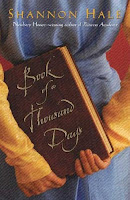
Hale, Shannon. 2007. Book of A Thousand Days.
Based on a tale from Brothers Grimm, Book Of A Thousand Days is an exciting read about a maid, a lady, two suitors, mistaken identities, disguises, love, and war. Dashti, our narrator, is a maid to the Lady Saren. The two, when the book opens, are being locked away in a dark tower because of the lady's refusal to marry the man her father has chosen: Khasar. The other suitor, the one she was secretly betrothed to, Khan Tegus, has been rejected by her father. The pair will remain locked away in the tower--under guard--for seven years. There is a cellar in the tower with what her father deems enough food for two to last seven years. But, let's say that the father didn't count on his girl's greediness nor the hunger of the rats.
Dashti is our heroine from the onset. Though she is a maid, she is the one our heart goes out to. She is the one we know is worthy of so much more. Saren, well, Saren is sullen and whiny and miserable and selfish and clingy. The book is a diary of their time together...their fears, their hopes, the dangers, their losses, etc.
I can't really relate much more without giving away too much...but I must say that this book was INCREDIBLE. I loved the story, loved the characters, loved the plot twists, loved the ending. It was satisfying from cover to cover.
This book--according to Amazon--will be released September 18, 2007. It will be released in the UK in March 2008.
Behind the scenes of Book Of A Thousand Days.
Miss Erin's review of Book Of A thousand Days.

Harrison, Mette Ivie. 2007. The Princess and the Hound.
If you've been reading this blog long, you've probably guessed that the more I love a book, the harder it is for me to express it clearly. This book had me at hello. I mean, I was hooked from the very beginning. I was under Harrison's magic spell immediately. Her writing, her style, is just unbelievable. The Princess and the Hound reads like a fairy tale--magic spells and all. It's enchanting. It's exciting. It's ever-so-good. You'd think that with the word "Princess" in the title, it would be narrated by a girl--a princess. You would think that it would be a love story of how a princess is swept off her feet by a prince from a neighboring country and who goes on to live happily ever after. But that is not this story. It is narrated by George. A prince. The story begins when he is quite young--probably four or five--and continues through his teen years. It is a story of a kingdom in turmoil. Those with animal magic are forced to live hidden, secret lives. Accused of being "evil" and "unnatural" by their animals for being able to talk to animals and communicate with them, their very lives are at stake if they are discovered. To possess animal magic is to be condemned to die a painful death. George and his mother, the Queen, shared a secret. Both have the magic. Both hide the magic. But it was in hiding the magic, in being untrue to herself, that the Queen succumbed to a terrible fever and died. George doesn't want to die, but he doesn't want to give himself over to the magic either. He wants to control it. Hide it. Suppress it as much as possible.
So far I'm doing an absolute horrible job in sharing what this story is all about. One boy, a prince, one girl, a princess. Two kingdoms trying to keep peace. An arranged marriage. Those are the bare facts without embellishment. George and the princess, Beatrice, have their own secrets, hurts, fears, worries. Each one has reasons to mistrust others and hide their "true" selves and true thoughts and feelings. It is in this gradual revealing to one another that all unfolds and the magic released to do its healing.
Love. Loss. Pain. Confusion. Fear. Hope. Forgiveness. Compassion. Justice. This book has it all.
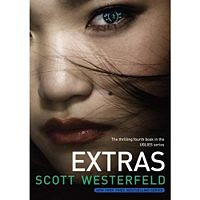
As I mentioned on Reading with Becky a few days ago, I have been reading (make that have read) Extras by Scott Westerfeld. I finished the book late on Tuesday. How to describe it here? Hmmm. Well, I've resolved to post NO SPOILERS. Since Westerfeld's blog posted the text of Chapter One, I consider that to be something I can freely discuss here.
Westerfeld's latest book, Extras, is due out this October. It begins three years after the mind-rain. What is the mind-rain? That is the phrase used to describe the global effects of millions of people's minds becoming unpretty. Specials concluded with Tally and David reuniting to become the new Specials who would watch societies and keep a look out for trouble and danger.
Extras opens with a girl, Aya Fuse, lying in bed and talking to her AI hovercam, Moggle. I like the similarities between the openings of Uglies and Extras. Both feature young fifteen year old girls, Uglies to be exact, who are planning on crashing a 'New Pretty' party. Of course their motivations are completely different, but their ability to pull off tricks makes Tally and Aya somewhat similar. But a lot has changed in three years. For one, this Uglyville and New Pretty Town are on the other side of the world--Japan. Second, this is all after the mind-rain so very few if any are left bubbleheaded. (The ones that are bubbleheaded, are bubbleheaded by choice.) This age group still parties. Parties a lot. But they don't all look alike anymore. They don't all think alike anymore. There are now dozens of dozens of different cliques. (Manga, tech, pixel-heads, kicker, surge-monkey, etc.) Third, this is a society based on fame and popularity. And what Aya wants more than anything in the world is to be famous. She'd have to be invisible to sneak into the party but that was no problem..."Aya Fuse was an expert at being invisible. Her face rank was proof of that. It sat unmoving in the corner of her vision: 451,396. She let out a slow sigh. In a city of a million, that was total extra-land." (4) Tally's driving motivation in Uglies was to be pretty. Aya's is to be famous. Both girls are strong, independent, and stubborn. Aya's story can't be separated from her friends. Hiro, her brother, Ren, her brother's best friend, Frizz, her 'radically honest' love interest, and Moggle, her AI hovercam.
As far as the plot goes, Aya's adventures are exciting, intense, suspenseful, and surprising. And that's all you'll get from me!
I think Westerfeld has yet again captured what it feels like to be fifteen and invisible and waiting for 'real life' to begin. That moody in-between time of wanting more. Of wanting all that life has to offer right then and there.
I have loved all of Westerfeld's YA novels: So Yesterday, the Uglies trilogy, Peeps and Last Days, the Midnighter trilogy. But I think this might just be my new favorite. It was very, very good.
Read my review of Uglies, Pretties, and Specials. I reread them all just before reading Extras.
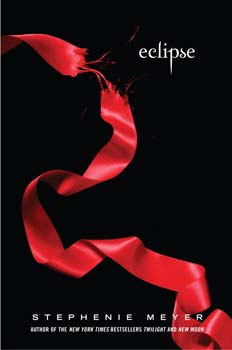 Spoiler free review of Eclipse by Stephenie Meyer
Spoiler free review of Eclipse by Stephenie Meyer
Meyer, Stephenie. 2007. Eclipse.
If you're like me, you've been waiting for the release of Eclipse since five seconds after you read the last page of New Moon. It's been eleven months of waiting. Eleven whole months of wondering just what would happen next between Bella Swan, Edward Cullen, and Jacob Black. Eleven months of wondering if this next book would be the one...the one where Bella's biggest dreams come true.
What does Eclipse offer readers? It has more Edward and Bella than New Moon. (But don't count out or young werewolf, Jacob. Jacob has not gone away. Bella doesn't want him to go away. Not on most days.) It has plenty of action as well. As with Twilight and New Moon there are bad guys--vampires actually--who are out to get Bella and friends. Which as you know always leads to an exciting climax complete with chase scenes and close calls. (But if you're a fan you've come to expect this. So my telling you this is not a spoiler!) After all, if it's talked about in the prologue on the first page...it's not really a shocker. It has action. It has romance. But it also has more family interaction. Whose family? Well, Bella's to a certain extent. But mainly Edward's...after all if she accepts his arrangement she'll be part of his family for life. This is something that I really enjoyed. We get more back stories on how this vampire family came to be. For example, we see how Rosalie came to be a vampire (152-168) and they have their first and only heart-to-heart talk. And we also hear Jasper's story for the first time (287-309). I have always loved Edward. And Alice, well, she's been fleshed out in the other books--both Twilight and New Moon--but for me this is the first time I really appreciated the ensemble cast of Cullens.
Another highlight, for me, was the presentation of werewolf folklore. Bella attends a bonfire with Jacob--as a friend not a date. (239-260)
Eclipse is exciting, fast-paced, full of action and romance. It is emotional. It is intense. It is wonderful. Did I love it as much as Twilight? No. I wouldn't expect to be as head over heels in love with any sequel. Twilight will always be my favorite and my best. But I thought the novel was good. The release of New Moon saw some skeptics who were thoroughly disappointed and hated the way the direction was going. That appears to be happening with Eclipse as well. Some are completely disenchanted with the series. And that is okay. Really. If I were in charge would I have done things differently...yes. There were slight things--things that could add up to a good bit of frustration if you kept count and read with initial mindset that the novel was going to be a bitter disappointment--that annoyed me in the book. So don't expect the book to be perfect. No book is perfect in every way. But try to keep an open mind.
I can't believe you're reading Wuthering Heights again. Don't you know it by heart yet?
Not all of us have photographic memories, I said curtly.
Photographic memory or not, I don't understand why you like it. The characters are ghastly people who ruin each others' lives. I don't know how Heathcliff and Cathy ended up being ranked with couples like Romeo and Juliet or Elizabeth Bennet and Mr. Darcy. it isn't a love story, it's a hate story.
You have some serious issues with the classics, I snapped.
Perhaps it's because I'm not impressed by antiquity. He smiled, evidently satisfied that he'd distracted me. Honestly though why do you read it over and over? His eyes were vivid with real interest now, trying --again-- to unravel the convoluted workings of my mind. He reached across the table to cradle my face in his hand. What is it that appeals to you?
His sincere curiosity disarmed me. I'm not sure, I said, scrambling for coherency while his gaze unintentionally scattered my thoughts I think it's something about the inevitability. How nothing can keep them apart -- not her selfishness, or his evil, or even death, in the end...
His face was thoughtful as he considered my words. After a moment he smiled a teasing smile I still think it would be a better story if either of them had one redeeming quality.
I think that may be the point, I disagreed. Their love is their only redeeming quality.
p. 28
http://stepheniemeyer.com/
http://stepheniemeyer.com/eclipse.html
http://stepheniemeyer.com/ecl_playlist.html
For a less enthusiastic review which contains a few spoilers
BookBinge's review of Eclipse; again not so enthusiastic; again has spoilers
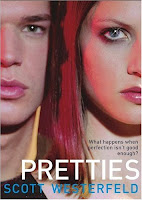
Westerfeld, Scott. 2005. Pretties.
I just finished reading Pretties by Scott Westerfeld. It is the second in the series. While I had only good memories about Uglies, Pretties has...well...in all honesty not stuck with me like the original. I knew it was about Tally. And I knew it was about her being pretty. And I remember how it ended. (I won't spoil that here.) But about 80% of the middle I had clearly forgotten. While I feel that Pretties is not nearly as clever as the original, it will keep readers reading on simply because they will want to know what happens to Tally and Shay and Peris. (Okay, maybe no one really cares about Peris. But Tally and Shay are pretty significant characters. And I don't think anyone who read and liked Uglies...can leave them hanging there....not caring to know what happens next.)
Tally is pretty now. So is Shay. They are running with the "Crim" crowd of bubble heads. To be a "Crim" you would have had to have been a trickster as an Ugly. A rule breaker. A rebel. And some of this mindset has remained. This is a group that likes to do tricks. Play pranks. Be seen as the rebels by the other pretties. Other pretties introduced to the story are Fausto and Zane. They will be important to the story. Especially Zane.
The story opens with Tally, Shay, Zane, and fellow Crims going to a pretty party. (Parties are all they ever do.) This party is slightly different. Someone from the Smoke--a teen who is still Ugly--is crashing the party to deliver a very important message to Tally. When Tally sees her old friend, Croy, she doesn't quite know how to react. Once you're pretty, seeing a person in their ugly-state is painful and unpleasant. But he tells her that he left something for her--he's hidden something just for her--in room 317 in the Valentino building.
Tally finds the mystery very bubbly-making. Tally and Zane set out to solve this mystery. What did he leave for her? Who is it from? What is expected from her? The solution is only the beginning of their problems...
Can Tally and friends ever be free of the mind control of the City?
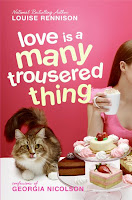
Rennison, Louise. 2007. Love Is A Many Trousered Thing.
Love Is A Many Trousered Thing is the eighth book in the Georgia Nicolson series. The first book, Angus, Thongs, and Full Frontal Snogging was a simply marvelous book. Very funny. Very different. Just enjoyable all around. And each of the sequels has to a certain extent had some of the same charm and humor as the first. But for the past two books really, I'm left wondering how much longer can Georgia go on. In each book, the reader sees Georgia getting beyond annoyed at her friends, especially Jas, and being torn between two guys. Oh, and we also see her do about ten embarrassing things per book. (Okay, maybe not that many, but she does get into quite a few "I carried a watermelon" situations.) Anytime that she converses or flirts with a guy, you can pretty much bet that she'll end up saying or doing something cringe worthy. Which is part the fun I admit. It is these moments that tend to be laugh-at-loud. (Like her weird dancing when her false eyelashes glued her eyes shut on the dance floor in the club.)
But for the eighth book, there really isn't much of the original charm left to go around. Not that formulaic fiction is always a bad thing. Georgia is Georgia. Her two guys? Masimo and Robbie. The Luuurve God. And the Sex God. The original Sex God from the first book. She spends three-fourths of the book trying to even figure out if either one of these boys wants to be her boyfriend. It is probably halfway through before she even has a conversation with one of the boys in question. So the book like most of the sequels is her complaining about her parents, her complaining about her friends, and her complaining because the guy isn't calling her. Georgia is the same old Georgia. Not changed one iota from book one, day one.
You might be thinking that I hated the newest book. It's not that I hated it. I was just disappointed. I loved the books. Especially the first five books. The series was working for me. Each one was a laugh riot. I couldn't get enough of them. And the sixth book was good. I enjoyed it. It had some great moments. But the seventh and eighth books....just feel very tired...and very pointless. Louise Rennison spends 250 pages going in one big circle. You always arrive back where you started.
Confused, complaining, complaining, fighting with friends, complaining, complaining, fighting with friends, complaining, complaining, snogging, complaining, snogging, feeling guilty, complaining, snogging, confused.
What makes Love Is A Many Trousered Thing enjoyable, because there were moments I enjoyed, is the fact that Dave the Laugh plays a role. He's not actually 'in' the book much. But he plays quite an active role in her imagination and in her thought process. And they do have a couple of conversations in the book as well. But her mind does become more and more preoccupied on him. Which if you're a fan of Dave the Laugh like I am (I must admit he's my favorite) then you'll enjoy this book.
For the record:
Angus, Thongs, and Full Frontal Snogging
On the Bright Side I'm now the Girlfriend of A Sex God
Knocked Out By My Nunga-Nungas
Dancing In My Nuddy Pants
Away Laughing On A Fast Camel
Then He Ate My Boy Entrancers
Startled by His Furry Shorts
Love Is A Many Trousered Thing
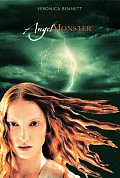
Bennett, Veronica. 2006. AngelMonster.
Releasing in paperback this August, AngelMonster is the exciting behind-the-scenes story of Mary W. Shelley and Percy Shelley. Mary was just sixteen when a young--but married--poet came into her father’s bookshop. The daughter of quite a famous--and radical--woman, Mary held much appeal to this romantic poet. Percy began pursuing her quite openly. Their chaperone? Mary’s stepsister Jane who was around the same age. Two young girls in love with the idea of love.
He might adore us all, but I adored only him. Handsome, brave, rebellious, gifted, and adhering without scruple to the principles of both my parents’ writings, he could do no wrong. Freedom for slaves! Freedom for women! Freedom from marriage! Freedom for all to love as, when, and where they will! And a freedom of his own, his championship of which impressed me more than any other. Freedom for the human race to live without the tyranny of religion! To my eyes he was beyond doubt a genius. I did not, indeed I could not, resist his charm. I saw no one but him, dreaming or waking. My eyes did not function unless he was there for them to look at. I fell in love so madly I almost did not recognize it as love. It was madness and nothing else. (34-35)
How strange. However much we plan, and hope, and map things in our minds, life never reads the same script as we have prepared. It tears up our predictions and laughs at us for presuming to make them. (40)
Percy Shelley had eloped with his first wife when she was but sixteen and pregnant. History repeated itself. After Shelley’s “It’s my birthday, and I want a present only you can give me” speech, Mary found herself with child. The pair ran away together--along with Jane--to Europe. Mary’s father and stepmother were beyond angry and grieved to lose both daughters to this immoral, practically penniless poet.
At first, life-on-the-run was exciting and thrilling for Mary. But soon having no money wasn’t quite as romantic. And being pregnant? Not so fun either. The book recounts their travels both in Europe and England as they look for the next-big-adventure or the next-big-burst of inspiration to come.
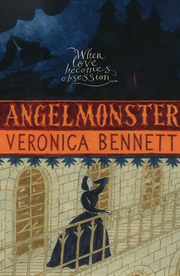
Along the way, the threesome meets the fellow poet Lord Byron. And the threesome becomes four as they find their way to Switzerland for the now infamous trip where the idea of Frankenstein came to life.
The book covers it all--Mary Shelley from sixteen until the death of Percy Shelley in an Italian boating accident. It covers a wide range of emotions--anger, frustration, love, devotion, loyalty, hate, bitterness, rage, pain--as Mary Shelley’s life changes time and time again...
AngelMonster is a fictional account of Mary and Percy Shelley. While many facts within are true, a few have been rearranged to fit the author’s own liking. For example, Mary Shelley in actuality wrote Frankenstein in 1818. However, in AngelMonster, Bennett doesn’t have Shelley writing and publishing Frankenstein until after her husband’s death in 1822.
Overall, I really enjoyed this one. It was great. I am a big fan of Frankenstein. And I had studied Mary Shelley’s life quite in depth as a graduate student in a class on the Romantic Poets. A class that focused more on the biographies of Keats, Percy Shelley, Mary Shelley, and Lord Byron...than on their actual works. (Well, that’s not exactly fair, it was more fifty-fifty.)
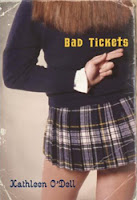
O'Dell, Kathleen. 2007. Bad Tickets.
1967. In the months leading up to the "Summer of Love." Two teenage girls, Catholic-school girls, are about to begin living life in a whole new way. Before Mary Margaret met Jane Stephens, she was somewhat of an ordinary girl. Not a risk-taker. Not progressive. Not shockingly wild. A good girl. A proper girl. But Jane. Jane's another story. She has her own way to do things, and it's a way that is more often than not frowned upon by the Catholic church. Two girls. Two very different girls. They want different things from life. Have different goals, hopes, and dreams. As the girls experiment with living life, meeting boys, partying, and some "recreational" drug use, the girls' learn some life lessons. Some good. Some bad. But the lesson that Mary Margaret learns the most is how to be a true friend. An unforgettable coming-of-age story.
http://www.kathleenodell.com/
View Next 25 Posts






























To the wish list it goes. Thanks, Becky!
Guys freak out; girls freak in. I'm going to remember that even if I never get around to reading the book.
i saw your link on the A~Z challenge, and the title intrigued me so i had to come see your review. i've now got both this one and Such a Pretty Girl on my to-read list. thanks!